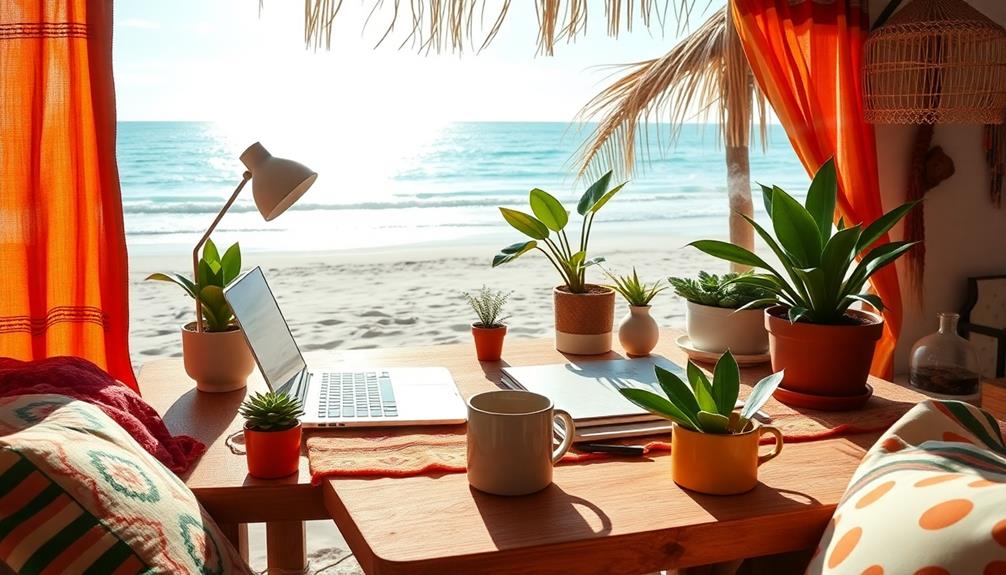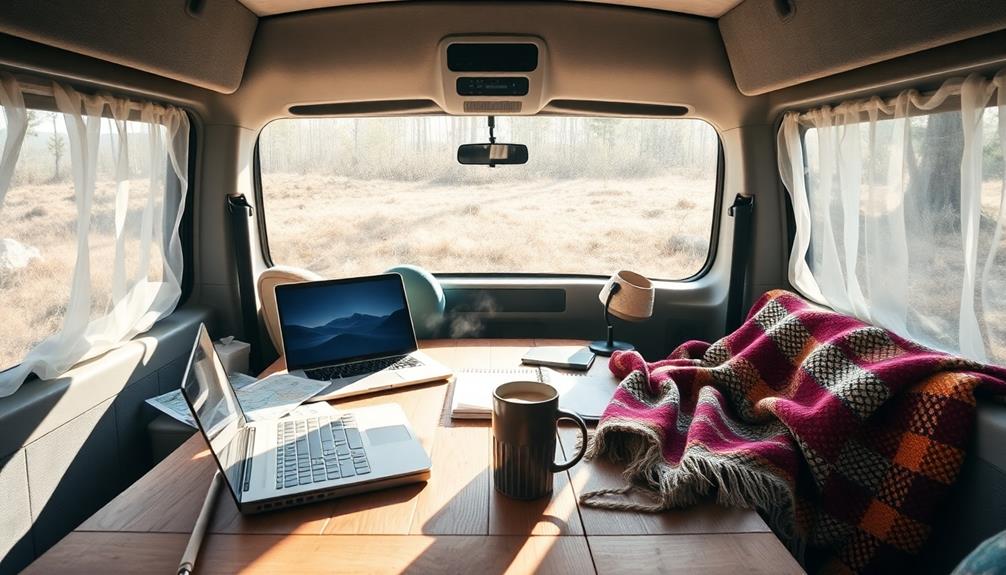Digital nomad life lets you blend work with adventure in a bohemian way. You can travel freely while keeping your job, thanks to the rise of remote work options. Imagine working from a beach or cozy café, all while enjoying lower living costs in different countries. You'll find various professional roles available online, from freelance gigs to remote positions with companies craving flexibility. But, it's not all easy; staying connected and managing finances can be a challenge. If you're curious about tips for a seamless shift and overcoming obstacles, you'll uncover valuable insights ahead.
Key Takeaways
- Digital nomadism combines remote work and travel, with over 15 million individuals in the U.S. embracing this lifestyle as of 2021.
- Diverse job roles, including freelance opportunities in writing, design, and tech, support a nomadic lifestyle while maintaining financial stability.
- Vehicles are often modified to serve as mobile workspaces, incorporating essential features like solar panels and reliable internet connections.
- Online communities and social media groups facilitate networking, collaboration, and job opportunities among digital nomads.
- Effective financial management and a minimalist mindset are vital for navigating the challenges of a mobile lifestyle.
Understanding Digital Nomadism
In the evolving landscape of work, understanding digital nomadism is essential for anyone considering this lifestyle. Digital nomadism combines remote work with travel, enabling you to work from virtually anywhere with an internet connection. The COVID-19 pandemic has accelerated this trend, with over 15 million digital nomads in the U.S. by 2021, reflecting a significant shift in how people approach their careers.
Traditionally, digital nomads were seen as young, educated, and mainly male, but this demographic is diversifying. People of various ages and backgrounds are embracing the nomadic lifestyle, motivated by the freedom it offers from conventional work structures.
With remote work becoming the norm, you'll find that many seek to reduce living costs through geoarbitrage and enjoy personal exploration.
The rise of online communities, co-living spaces, and supportive visa schemes has made digital nomadism more accessible than ever. By adopting this lifestyle, you can achieve a better work-life balance, combining professional responsibilities with the adventure of travel.
Ultimately, understanding digital nomadism opens the door to new experiences and opportunities that can enrich both your personal and professional life.
Profiles of Nomadic Lifestyles

Digital nomads embody a diverse range of lifestyles, each uniquely tailored to their passions and professions.
Take Brian, the Off-Grid Aficionado, for example. Since 2015, he's balanced remote work as a podcast host and ranch hand, living between his custom-built Tacoma 4×4 and off-grid campsites. His lifestyle showcases how one can thrive in nature while working.
Then there's Laura, the Content Creator, who combines her love of photography and writing while living in a van. By drawing inspiration from outdoor environments, she co-hosts the "Women On The Road" podcast, blending work and exploration seamlessly.
Her mobile lifestyle allows her to capture the beauty around her while staying productive.
Lastly, meet Laysea, the Traveller & Freelancer. After shifting from a conventional job, she embraced a full-time traveling position, engaging in community roles like yoga teacher and kayak guide.
Living in her van, she embodies the idea of a mobile lifestyle, discovering new opportunities along the way.
These profiles highlight the various ways digital nomads integrate remote work with travel, emphasizing unique experiences and job roles that shape their lifestyles.
Mobile Workspaces and Vehicles

When you hit the road as a digital nomad, your vehicle becomes more than just transportation; it's your mobile workspace.
You'll want to make essential modifications to balance comfort and mobility, creating a functional area that meets your work needs.
Essential Vehicle Modifications
Essential vehicle modifications are crucial for digital nomads seeking to balance work and travel. When you're working remotely, your vehicle needs to function as both a workspace and a home. Converting vans or trucks into mobile workspaces can include features like kitchen counters that double as work surfaces, reliable electrical systems, and comfortable sleeping arrangements.
Integrating high-quality materials and innovative designs not only enhances the workspace but also boosts your credibility as a mobile worker, aligning with content relevance and authority in your niche.
Take inspiration from Brian's 2005 Toyota Tacoma 4×4, which boasts essential upgrades like a solar shower and cell phone boosters for off-grid living. Or consider Laura's converted 2013 Ford Transit Connect, equipped with a 200 amp hour battery and porthole windows, merging functionality with aesthetics.
Laysea's classic 1983 VW Westfalia showcases practicality with a double burner stove and pop-up top—perfect for an enjoyable lifestyle on the road.
Your modifications can range from basic storage solutions to advanced tech setups, emphasizing the importance of creating a dual-purpose gear kit for living and working efficiently.
Creating Functional Workspaces
Creating a functional workspace within your mobile living environment is key to thriving as a digital nomad. Whether you're in a cozy van or a spacious RV, your mobile workspace should be designed for efficiency and comfort.
Start by incorporating multi-purpose furniture; for instance, a kitchen counter that doubles as a workstation can save space while providing a dedicated area for remote work. Additionally, consider integrating elements that promote a calm environment, such as a peaceful color palette, which can enhance focus and productivity, similar to how you'd set up a Montessori-inspired nursery for a child.
Ensure you have a reliable internet connection to stay connected and productive. Invest in technology solutions like cell phone boosters and portable Wi-Fi devices, which can dramatically improve your access to the internet while on the road.
Additionally, consider power sources such as solar panels or batteries to keep your devices charged.
Look at examples like Laura's converted Ford Transit Connect, which emphasizes natural light and comfort, or Brian's rugged Toyota Tacoma 4×4, designed for outdoor adventures while maintaining workspace functionality.
Your choice of vehicle will influence your workspace design, so choose one that aligns with your lifestyle preferences and needs. By thoughtfully creating your mobile workspace, you'll maximize your productivity while enjoying the freedom of the nomadic lifestyle.
Balancing Comfort and Mobility
While balancing comfort and mobility can be challenging, it's vital for digital nomads to find the right vehicle that suits their lifestyle. Your choice of a mobile workspace greatly impacts not just how you work, but where you can go. Converted vans or RVs, like Laura's Ford Transit Connect, provide a comfortable living and working environment.
To help you understand the options, here's a quick comparison of popular vehicle types for digital nomads:
| Vehicle Type | Key Features |
|---|---|
| Van | Kitchen counter, flexible workspace |
| RV | Full amenities, spacious living |
| Truck (e.g., Tacoma) | Off-road capability, solar power |
| Classic VW | Compact, nostalgic, camping-friendly |
Incorporating power solutions, like solar panels, guarantees you have reliable energy for all your devices. And don't forget about minimalist living; dual-purpose gear and efficient space use can maximize comfort in limited square footage. Ultimately, flexibility in your workspace location—whether in a cozy cafe or a serene nature spot—enhances your productivity and connection to your surroundings. Embrace the balance of comfort and mobility to enjoy the digital nomad life fully!
Employment Opportunities for Nomads

For digital nomads, finding employment opportunities has never been easier, thanks to a variety of platforms and flexible work arrangements. You can tap into freelance sites like Upwork and Fiverr, which open the door to a global job market. Here, you'll find diverse opportunities in fields like writing, design, and programming, allowing you to work remotely while exploring new places.
Additionally, having a solid budget can help you manage your finances effectively as you navigate different locations. Many companies now embrace remote work, offering roles in tech, marketing, and customer service that fit your nomadic lifestyle. This flexibility means you can maintain a stable income while traveling.
Don't underestimate the power of networking, either. Engaging with online communities and social media groups dedicated to digital nomadism can lead to hidden job opportunities and collaboration with other remote workers.
Additionally, consider gig economy roles that align with your skills, such as teaching English online or offering tours and workshops. These gigs can create income streams tailored to your interests.
With over 15 million digital nomads in the USA as of 2021, the acceptance of remote work continues to grow, highlighting the demand for professionals who can work from anywhere.
Tips for a Successful Transition

Shifting to a digital nomad lifestyle can feel overwhelming, but taking it step-by-step makes the process smoother. Start by testing the off-grid lifestyle part-time, as it can provide insights into how to effectively manage your finances, including potential IRA rollover to gold strategies that protect your savings. This helps you determine if this new way of living aligns with your work and personal needs before fully committing.
Embrace a minimalist mindset by downsizing your belongings; it'll make adapting to a mobile lifestyle easier and more efficient.
Next, establish a reliable internet connection. Invest in unlimited data plans and portable Wi-Fi hotspots to guarantee you stay productive while traveling.
Create a dual-purpose gear kit that allows you to easily switch between work and leisure. This maximizes your limited space and guarantees you have what you need for both remote work and exploration.
Challenges of Nomadic Living

As a digital nomad, you'll likely face challenges like maintaining a healthy work-life balance, especially when your workspace is also your living space.
Finding a secure place to stay is essential, as ensuring your belongings are safe can add to your peace of mind while working remotely.
Internet connectivity can be a constant worry, with spotty service sometimes derailing your plans.
Plus, managing financial stability while traveling can add another layer of stress to your nomadic journey.
Investing in a reliable home security system can help protect your assets and provide a sense of security wherever you go.
Work-Life Balance Struggles
Digital nomads often struggle to maintain a healthy work-life balance due to the blurred lines between their work and personal spaces. The overlap can lead to challenges in separating professional obligations from leisure activities.
As an aspiring digital nomad, you may find it hard to resist working while exploring new locations, which complicates your time management, especially when adapting your schedule around travel plans.
Time zones can add to the stress, as coordinating with remote teams may lead to missed meetings or delayed responses. This confusion not only affects your efficiency but also increases the pressure to perform.
You might feel the weight of your successes and failures resting solely on your shoulders, making it difficult to prioritize downtime.
Regular vacations and unplugging are essential for preventing burnout, yet many nomads struggle to carve out that essential time off amidst their travel commitments.
Maintaining a productive routine while maneuvering the freedom of a nomadic lifestyle requires constant effort, and it's easy to lose sight of that critical work-life balance.
Internet Connectivity Issues
A stable internet connection is essential for anyone adopting the digital nomad lifestyle. Without it, remote work can quickly turn into a frustrating experience, leading to missed deadlines and decreased productivity.
As you commence your journey of work and travel, you'll likely encounter various connectivity challenges that can disrupt your flow. To mitigate these issues, consider getting local SIM cards and data plans whenever you land in a new destination. This can guarantee you have internet access even when Wi-Fi isn't readily available.
Researching your destinations ahead of time is significant; knowing where to find reliable Wi-Fi can save you from unnecessary stress when setting up your mobile workspace. Investing in a mobile hotspot device adds another layer of reliability, particularly in remote areas where public Wi-Fi mightn't exist.
Embracing these tools allows you to adapt your work habits and schedules to the varying availability of internet connection. Ultimately, developing problem-solving skills around connectivity challenges is essential for thriving in the digital nomad lifestyle, guaranteeing you can maintain both productivity and flexibility as you explore the world.
Financial Stability Concerns
Many aspiring digital nomads face financial stability concerns that can turn their dream lifestyle into a stressful reality. You might find yourself juggling variable income streams from freelance work or gig roles, which can fluctuate considerably from month to month. This unpredictability can make budgeting a challenging task.
Many nomads rely on geoarbitrage, earning higher wages in developed countries while living in lower-cost areas. While this can be advantageous, it requires careful financial planning to maintain stability. Reports indicate that about 50% of digital nomads experience financial insecurity at some point, underscoring the importance of having a financial cushion for lean periods or unexpected expenses.
Additionally, managing health insurance and travel-related costs can complicate your financial situation. You'll need to account for regular expenses and prepare for emergencies while on the road.
Access to reliable internet and co-working spaces, essential for productive remote work, can also add to your overall costs. By proactively addressing these challenges, you can enhance your financial stability and make your nomadic lifestyle more sustainable.
Resources for Digital Nomads

As you commence your digital nomad journey, tapping into the right resources can make all the difference. You'll discover that various platforms and communities are tailored to enhance your remote work experience while helping you find that perfect balance between work and travel.
Here are some invaluable resources to reflect upon:
- Blogs: Check out "The Remote Life" and "Nomadic Matt" for job opportunities, productivity hacks, and destination guides.
- Job Platforms: Use "Remote.co" and "Remote OK" to explore extensive remote job listings and gain insights into trends in remote work.
- Online Communities: Engage with networks like "Digital Nomad Soul" and "Be My Travel Muse" for practical tips, female-specific advice, and support in budgeting and travel hacking.
Additionally, dedicated visa schemes and coliving spaces are becoming popular resources for nomads, easing adjustments to new locations and fostering a sense of community.
Frequently Asked Questions
Can You Be a Digital Nomad With a Remote Job?
Yes, you can absolutely be a digital nomad with a remote job! Many companies offer flexible arrangements, allowing you to work from anywhere. Embrace the freedom to travel while maintaining your professional responsibilities.
Is Digital Nomad Life Worth It?
Isn't life too short to stay in one place? Embracing the digital nomad lifestyle can be worth it if you crave adventure and flexibility, but it demands discipline and balance to thrive amidst constant change.
What Is the Difference Between a Digital Nomad and a Remote Worker?
A digital nomad travels frequently, adapting work around exploration, while a remote worker usually stays in one place, prioritizing stability and a dedicated workspace. You'll find adventure with nomads but routine with remote workers.
Is 30 Too Old to Be Digital Nomad?
No, 30 isn't too old to be a digital nomad. You can embrace this lifestyle at any age, leveraging your experience and skills. The freedom and flexibility of remote work can enrich your life considerably.
Conclusion
In embracing the boho lifestyle of a digital nomad, you're not just changing your workspace—you're transforming your entire existence into a magnificent tapestry of adventure and freedom. With every sunrise in a new city, you're weaving unforgettable memories and crafting the ultimate life of your dreams. So, grab your laptop, pack your wanderlust, and set off on this thrilling journey where work meets wander—because who needs a cubicle when the world's your office?










